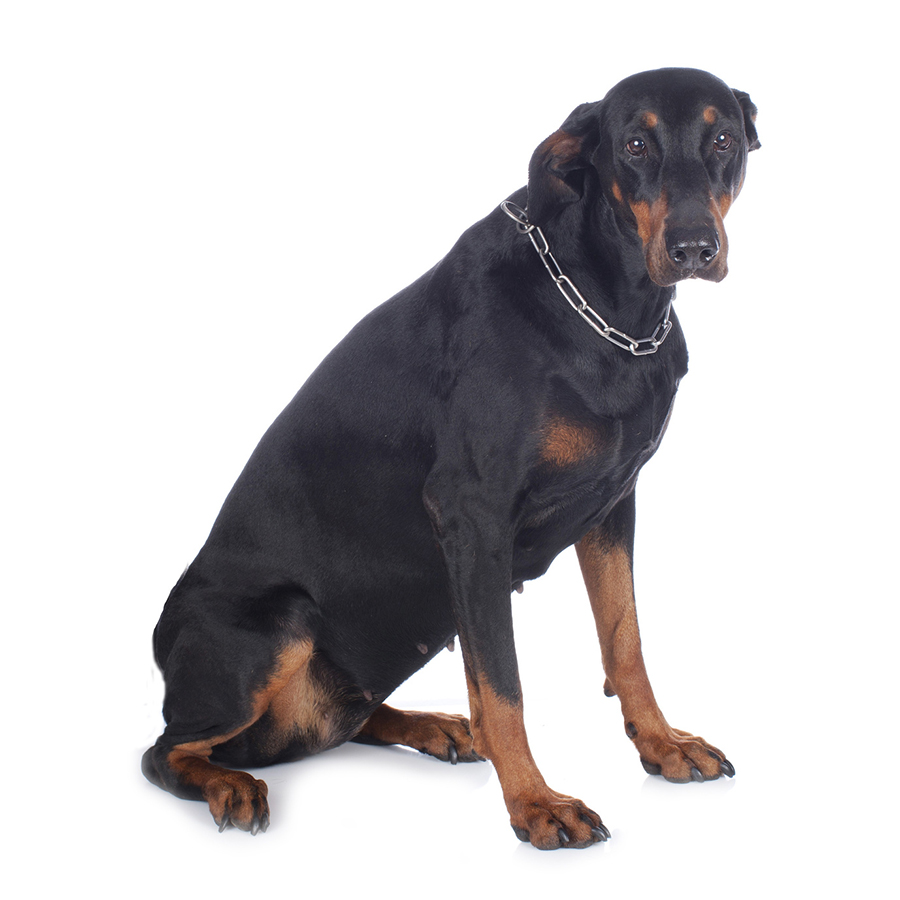Dilated Cardiomyopathy in Dogs (DCM)
What is Dilated Cardiomyopathy?
Dilated means “larger than normal” and Cardiomyopathy means “pathology of the heart muscle”. Dilated Cardiomyopathy occurs when the heart muscle becomes weaker and thinner (more “flabby”) and thus does not contract properly. The effective result is that the chambers of the heart dilate or enlarge. The cause is thought to be genetic in origin and breeds most commonly affected are Doberman, Boxer, Cocker Spaniel, “Pure” Giant Breeds (e.g. Newfoundland, Irish Wolfhound etc).
How is it diagnosed?
The most common presenting sign is exercise intolerance, shortness of breath and coughing. On clinical examination, a murmur can often be heard when listening to the heart with a stethoscope. A murmur is the sound that occurs (much like a “woosh” sound instead of a crisp beat sound) because of the turbulent blood flow that goes back up through the valves that seperate the atria from the ventricles. The heart rate is often increased and the pulses may be weak.
The most common diagnostic tests done include x-rays, ultrasound and blood tests and an ECG. Blood tests may sometimes also be necessary to see if all the organs are getting enough blood supply and whether there are any underlying problems.
What is a heart ultrasound and is this necessary?
A heart ultrasound or an echocardiographic examination, is a scan that is done on the heart to establish a few things. During the procedure one can actually visualize the heart contracting and can measure the blood flow back through the valve. There are many other measurements taken during a heart ultrasound that give us a much better picture of the entire problem and what treatment would be best for your pet, for example:
- Measure how much the heart muscle is actually contracting – this can tell us if there is enough compensation for the valve problem and whether we need to give something to help the heart muscle or not.
- Measure the blood outflow through the aorta – this is a very important measurement because it tells us if there is enough output from the heart to maintain blood pressure and blood flow to all the organs.
- Measure the size of all the chambers of the heart
- Measure and visualize exactly how much blood is going back through the valve
- Can visualize the actual valve and measure the thickness
All of these put together will enable us to decide on the best approach toward treatment and management of your pet.
What is the treatment?
Treatment is aimed at relieving any clinical signs (mainly coughing) and helping the heart cope with the problem. If the ultrasound suggests that treatment may be beneficial (even in the absence of clinical signs), then conservative management and treatment is normally required. In advanced stages, many treatments are normally required. The most common drug used is a diuretic, to remove any fluid build up on the lungs and thus alleviate the coughing. Other drugs that may be used include vasodilators (drop blood pressure) and specific heart medications to help the heart contract better or control the rhythm of the heart.
What is the prognosis?
Many pets with dilated cardiomyopathy live normal, happy lives for an extended period of time. The time it takes for development of problems is extremely variable. Although the condition is irreversible, with the advancement of diagnostics and treatments, the treatment for many cases can be very rewarding.




